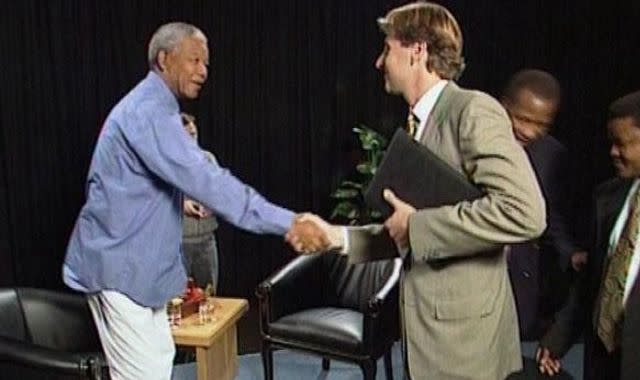South Africa election: Nelson Mandela would turn in his grave at his country today

It was a joyful day 30 years ago in a South Africa that had enjoyed very few.
It was the first truly democratic election, and the black majority - for so long the victims of the wretched oppression imposed by apartheid - finally had their say.
And how they spoke!
I watched them queue in Soweto in the sunshine, dancing and singing as they waited. And it was a long wait.
The system couldn't cope. South Africa wasn't used to everyone being able to vote. But wait they did, long into the night to cast their first ever vote... for a black party... led by a black man… the black man who had fought for and led and carried the African National Congress (ANC) to this moment.
One grandmother told me that she could "die happy now" because "I know my children and my children's children will no longer be without a vote in their own country".
But today, I have to say, Nelson Mandela would be turning in his grave. His ANC has been humiliated at the polls.
After the ANC victory in 1994 (they won with 62% of the vote) I interviewed Mandela. He spoke of course of his rainbow nation, but said it would not be easy.
Decades of apartheid meant poverty, exclusion and a lack of hope and, above all, education that would take years to even begin to address.
"Don't judge us in five or 10 years," he told me. "It will take 20 years, 30 years, a generation and more to get things done."
Well, 30 years on things may be better, but the lives of the black majority in this great country have certainly not been transformed.
Some have, of course. But many still struggle with the daily reality of poverty, poor sanitation, hopeless infrastructure, endless power crises and unemployment. A third are jobless and that is no way to win votes.
Read more:
What's left of ANC support is held together by deep loyalty and desperate hope
Inside Mandela's childhood home - now another impoverished village
And the corruption eats away at the fabric of society. Corruption at almost every level of government has seen businesspeople plunder state resources and political leaders fill their own pockets.
And today we see Mandela's ANC paying the price. They are struggling to muster even 40% of the vote.
They will fall hopelessly short of a majority for the first time and will have to do deals to rule this country in a coalition of opposing forces. It will be difficult, turbulent and uncertain for the people.
And it is the most bitter of ironies that one party they may well have to deal with is the new party of an old president, Jacob Zuma, who was forced to quit in 2018 after a string of corruption scandals.
Zuma joined the uMkhonto weSizwe party in January to campaign against the current president, Cyril Ramaphosa, who he said was a proxy for South Africa's wealthy whites.
I met Ramaphosa several times in the early nineties. He was a union leader and senior negotiator during the talks that ended apartheid.
He was highly thought of and also a great friend of Nelson Mandela. Mandela always thought Ramaphosa would be president one day - he would be disappointed by the way it has turned out.
Surviving this catastrophic result would be a good outcome for Ramaphosa.
Globally, the ANC has chosen its role. It seeks a world where developing countries have more influence, where US power should be curbed and where China and Russia are its friends and partners. Its legal actions against Israel have won support among some, but contempt from others.
But while Mandela would be bitterly disappointed at the failure of the ANC to transform from liberation movement to a truly effective government for the people, he would no doubt be reassured that a still fledgling democracy was working. The people of South Africa have done what democracies do and, if not exactly turfing out the ANC, they have delivered a message of dissatisfaction.
But right now, a period of political turbulence is just what South Africa does not need. It needs political stability and a government intent on tackling corruption, inequality and crime. It needs hope and optimism and - dare I say it for fear of over-romanticising things - another Nelson Mandela.


